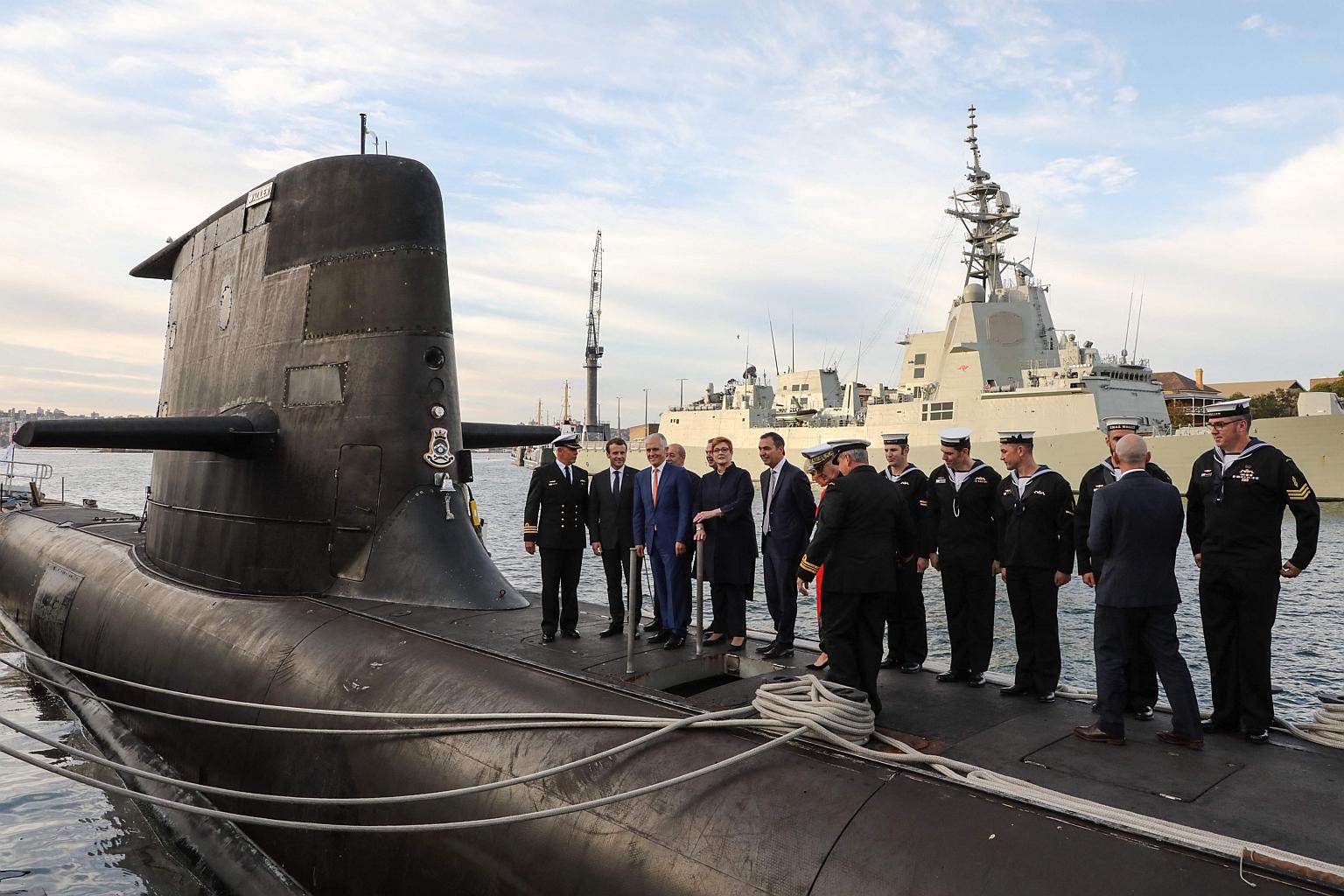Aussie nuclear-powered sub plan raises fears of arms race
Sign up now: Get insights on Asia's fast-moving developments

French President Emmanuel Macron (second left) and then Australian PM Malcolm Turnbull (third left) standing on the deck of a Royal Australian Navy Collins-class submarine in 2018.
PHOTO: AFP
SYDNEY - Australia's plan to acquire nuclear-powered submarines is encountering growing opposition - especially from countries in Asia - over concerns that this would increase the risk of a global nuclear arms race.
Australia does not have nuclear weapons but plans to develop nuclear-powered submarines, after reaching a deal last year for the United States and Britain to supply it with the technology and nuclear material. The submarines will carry conventional weapons only.
But the deal has raised concerns about the potential risks of allowing nuclear material to be used for military purposes, even if not for nuclear arms.
Under the international nuclear non-proliferation treaty (NPT), the US and Britain, as recognised nuclear-weapon states, have pledged not to supply nuclear weapons or assist other states in acquiring them. Non-nuclear-weapon states such as Australia are barred from receiving or acquiring nuclear weapons.
China recently released a report by two state-backed think-tanks that said the submarine project would set a "dangerous precedent" and could lead to nuclear proliferation in the region.
The report criticised the move by the US and Britain to transfer weapons-grade nuclear material to a non-nuclear-weapon state such as Australia, saying the deal risked an "arms race in nuclear submarines and missile technology proliferation".
China's opposition to the submarine project is not surprising, particularly as its ties with Australia have been frosty in recent years. The submarines would allow Australia's navy to operate in waters far from shore, potentially in contested regions such as the South China Sea.
But China has not been the only country in Asia to express concern about the project.
Indonesia, which has friendly ties to Australia, has also warned that allowing nuclear-powered propulsion could lead to the spread of nuclear arms.
In a paper submitted to a United Nations conference that began this week to review the NPT, Indonesia said sharing nuclear technology and material for military purposes may be counter to the objective of the treaty and could set a precedent for other similar arrangements.
The paper said sharing nuclear technology could lead to "new types of weapons of mass destruction, derived from the combination of nuclear materials and conventional weapons". It suggested that the use of uranium for nuclear propulsion should be banned because such projects could be "exploited" to conceal nuclear weapons programmes.
Jakarta said the submission was not specifically aimed at Australia's proposed submarines, saying its concern targeted nuclear naval propulsion in general. Brazil, a non-nuclear-weapon country, is also developing nuclear-powered submarines, as part of a contract with French company Naval Group.
Malaysia has reportedly backed Indonesia's position. Both countries have raised concern about nuclear-powered submarines passing by their waters.
But Australia has insisted that its submarine programme will comply with non-proliferation requirements and that it has no intention of acquiring nuclear arms.
In Cambodia for a meeting with Asean and global leaders last week, Australian Foreign Minister Penny Wong said her country was working with the International Atomic Energy Agency (IAEA) to ensure that the "highest possible standards" apply to the submarine programme.
"Australia has, I think, a very strong track record in its non-proliferation obligations, and we will, if anything, seek to strengthen them through this process," she told reporters.
But criticism of the submarine project has also emerged among some analysts in Australia and the US.
Four former US officials wrote to President Joe Biden last month to raise concerns, saying that providing enriched uranium to Australia could lead other states to "justify their own production or acquisition of (highly enriched uranium) fuel".
The officials, all non-proliferation experts, said the submarines should use low-enriched uranium, a material that could not easily be used for nuclear weapons because it would first need further enrichment.
Australia, the US and Britain defended their deal in a paper submitted to the UN conference, saying that they were working with the IAEA to develop a verification approach that will ensure that nuclear material used for the Australian submarines is not put to other uses.


